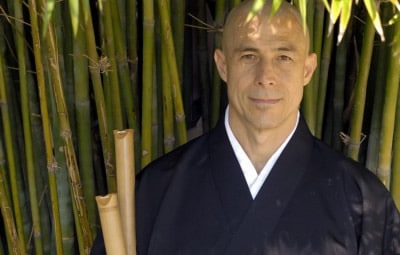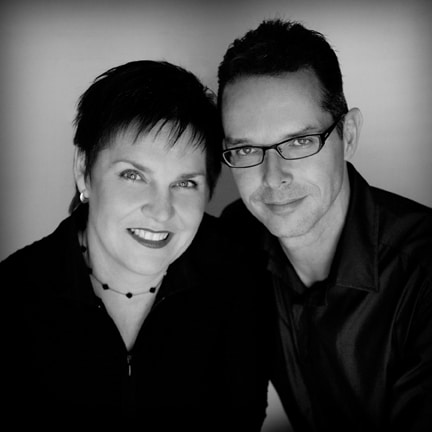
Frans spoke to shakuhachi player and TaikOz performer Riley Lee.
TaikOz was formed in 1997 by taiko player/percussionist Ian Cleworth and shakuhachi dai-shihan, grand master Riley Lee. The group has established itself as one of Australia’s most energetic and exciting drumming groups. Combining the awesome power of the traditional Japanese taiko with the ethereal tones of the bamboo shakuhachi, TaikOz seeks to explore a synthesis of East and West, old and new.
Riley Lee is Australia’s only Grand Master of the shakuhachi and one of the few outside Japan. He began playing the shakuhachi in Japan in 1971. For three years he toured internationally as a full-time member of Ondekoza – The Demon Drummers (now called Kodo), a group of traditional Japanese musicians.
Riley’s studies with traditional teachers in Japan have included such peculiar methods as practising barefoot in the snow, blowing into his flute under waterfalls and in blizzards until icicles form at its end, and running the Boston Marathon and then playing taiko at the finish line.
In 1980, he became the first non-Japanese to attain the rank of Dai Shihan – grand master in the shakuhachi tradition. His present shakuhachi teacher Is Katsuya Yokoyama, one of the world’s most respected masters of the Zen inspired repertoire.
Riley Lee discussed with Frans his views on practise in relation to his own experience as a student and as a teacher. We’ve included some of his thoughts below:
The whole of idea of performing and presence is something that TaikOz really thinks about. The stage – its our office, its our workplace and in some ways it’s our temple. It’s where we attain our highest aspirations. It’s where we come closest to our God.
We are imperfect, we are human, we make mistakes on stage. We desecrate our temple. But with that idea that this is where it happens. If you have that idea it becomes second nature – even in preparing to enter the temple, stage.
As a performer the minute we enter that building, it’s special now. Even subconsciously things start changing, physiologically to us. At the point of walking on stage hopefully that difference is communicated to the audience. As TaikOz members I think we have to and are getting better at it as well. It is that we are transcending just your everyday experience and we are giving a transcendental experience to the audience. It’s different for us, it’s transcendental for us as performers and consequently as spectators it’s different too. In a sense the audience and performers are all experiencing the same thing.
That idea of specialness, from a zen point of view, is the goal. You make the stage your temple and you make that your special place. You start working on it – then you encompass the whole theatre – so the dressings rooms are also special. And then you encompass the drive to the theatre – that’s special too. And then you encompass the preparation the night before. And then you encompass the rehearsals so that eventually your whole life becomes special and every moment is special. And that is almost a paradox – how can everything be special?
If everything is special then nothing is special. But that’s where you get the difference between talking about absolute and relativity. And which is why when people talk about zen they become very tongue tied. So first we start with the stage, for example with Reiki the practitioner might start first with the moment that he or she is with the client.
One story that Riley told Frans to explain his basic practise belief was about Mrs Brown, his 4th grade teacher:
She was really into handwriting and I was a lousy handwriter. We’d practice loops and we’d practice over and over again and she’d look at me and my stuff and I’m in the 4th grade and she’d say, “Riley, you just don’t get it – we are practicing but its not just practise. You know the adage – Practice Makes Perfect?” she says. “That’s not true, that’s not true at all. If you practise badly you just get good at doing it badly. If you practice imperfections – you just get good at imperfections.
So the adage should say Perfect Practice Makes Perfect. You can practise till the cows come home but you’re not going to get good. You can practice how you are practising you’re writing and you’ll never get good at your writing.”
So you’ve got to have the motivation or the inclination or the objective to do it perfectly even if it isn’t because you’re still practising but it’s got to be your goal.
So, perfect practise makes perfect and everything in moderation including moderation.
If you’d like to find out more about TaikOz and their performers please visit their website.
And if you’d like to find out more about Riley Lee himself you can visit his website.
Bronwen and Frans Stiene are the co-founders of the International House of Reiki and co-authors of The Reiki Sourcebook, The Japanese Art of Reiki, Your Reiki Treatment, The A-Z of Reiki Pocketbook and the Reiki Techniques Card Deck. Bronwen and Frans teach in the USA, Europe and Australia. Visit the Courses page to find a course near you.

